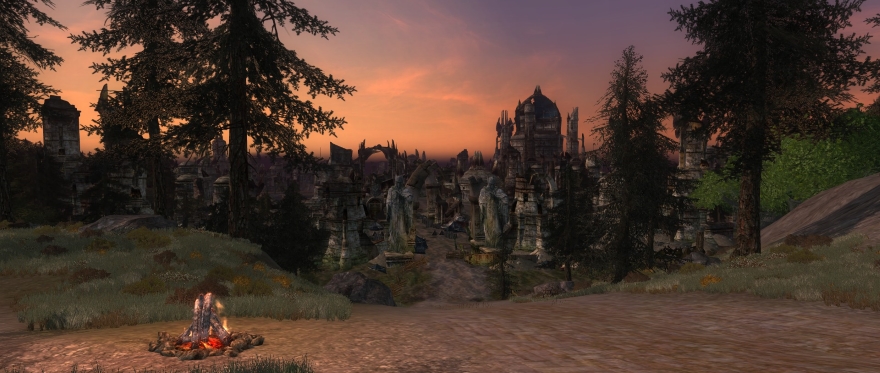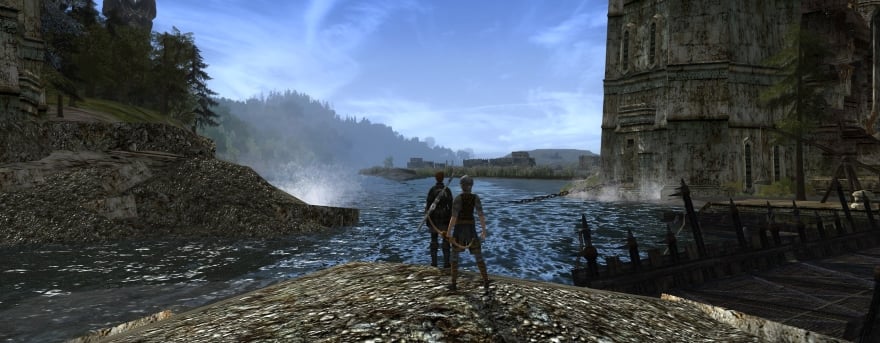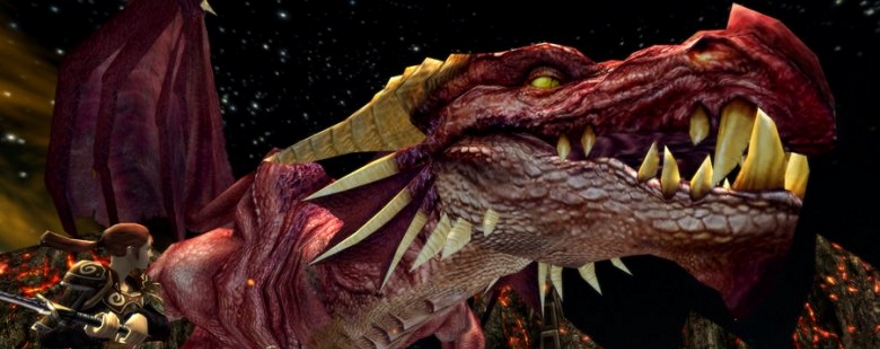
While Standing Stone has been communicative over the past month, we wanted to dig deeper into the decision to form the new studio, its relationship with Daybreak, and plans for both DDO and LOTRO going forward. To wit, we sat down with Standing Stone Executive Producer Rob “Severlin” Ciccolini, Lead Designer Ben “DrOctothorpe” Schneider, and Community Manager Jerry “Cordovan” Snook to discuss this major transition and its possible impact for these two MMO game worlds.
Massively OP: Can you give us a history of how this new studio came to be?
Jerry Snook: Standing Stone Games was formed to prioritize our existing games rather than venturing into the mobile space. It was important for our teams to concentrate on our games, while Turbine has been shifting its priority to new projects.
Why was the decision made to form Standing Stone in the first place, how long ago did the process begin, and how complicated was it to move everything over from one studio to another?
Jerry Snook: The process has taken quite a while, due to all of the various factors that had to be worked out in order to make this a reality. This process began earlier in 2016, and took many months to get to a place where we were ready to announce the transition.
Rob Ciccolini: Take the worst-case scenario you can think of, then multiply it by 10.
Who is Standing Stone Games’ CEO right now?
Jerry Snook: We don’t have a CEO, but Rob, the Executive Producer, is our studio head.
How was the physical moving process to your new home? How did that impact the physical servers?
Jerry Snook: We split the existing office into two separate offices, so the process of physically moving desks and such wasn’t particularly difficult. The physical servers were not impacted.
Do you see (or have you examined) any similarities between your transition to Standing Stone with what Broadsword did with DAoC and Ultima Online? We are curious if you looked at that studio for information in making your transition.
Jerry Snook: I didn’t.
Ben Schneider: I’m not intimately familiar with it.
Rob Ciccolini: Our course was relatively straightforward, but if there are similarities, that’s cool.
Did the studio transition free up your team to make decisions for LOTRO and DDO that you weren’t able to before or were held back? If so, can you elaborate?
Jerry Snook: We have never felt particularly constrained by Warner Brothers or Turbine, but the transition allows us to concentrate on these games.
What’s the atmosphere like in the new studio? Did the transition exhaust everyone, give the team a morale boost, or kept things going pretty much the same as before?
Ben Schneider: We printed t-shirts as soon as we could.
Rob Ciccolini: My answer might be different than our Tech Ops team.
Jerry Snook: The teams have been working together for a long time, so the energy is usually quite high. Overall, the transition was a lot of work, and for some folks was pretty exhausting, but there’s a lot of energy and excitement as well.
What are the specifics of your publishing arrangement with Daybreak?
Rob Ciccolini: We are an independent studio, but our goal is to leverage Daybreak’s technology and scale when we feel it is best for the players. Daybreak will be providing global publishing support for both Lord of the Rings Online and Dungeons & Dragons Online.
Why did Standing Stone decide to go with Daybreak over other publishers in the games industry? What did they offer that others didn’t? Or did better?
Jerry Snook: It was a good arrangement for everyone involved, and Daybreak has experience in this kind of game transition.
Does Daybreak own any part of Standing Stone or has it provided funding?
Rob Ciccolini: Financial terms are not something we want to make public, but we can say it is a traditional funding arrangement for the game industry.
In a hypothetical situation, say Daybreak folded tomorrow. How would that impact Standing Stone? Do you have the freedom to switch publishers if need be?
Jerry Snook: Let’s face it, that’s an unlikely scenario. This isn’t really something we are able to provide a formal answer to, as it isn’t something we’re worried about.
You can’t provide an answer as to whether or not you have the ability to change publishers if your studio wanted or needed to?
Jerry Snook: We’re talking high-level legal stuff, so it’s probably better to leave these kind of questions to them.
How many employees does Standing Stone have? Are they split firmly between teams or do some personnel overlap?
Jerry Snook: We were fortunate to be able to bring over our live teams and add some additional personnel. In general, the teams are split in a way where we work as separate teams with the ability to do some overlap as the demands of upcoming releases require. There are also some shared resources like community, eCommerce, and art. (We don’t provide specific head counts, though, sorry.)
How many former Turbine employees made the jump to Standing Stone?
Jerry Snook: All of the employees who worked on the LOTRO and DDO teams moved over to Standing Stone Games.
Why did Standing Stone elect not to buy the Asheron’s Call games and bring them over as well?
Jerry Snook: We are not able to speak about Asheron’s Call-related questions. Those questions should be relayed to Turbine.
So you can’t speak to private servers either?
Jerry Snook: No, sorry.
I know talking about the IP licenses for DDO and LOTRO is far from your favorite thing, but we would appreciate some clarity on how secure these licenses are going forward as this topic is of some concern to the game communities. When you say that, for example, LOTRO is “safe,” do you mean this year or forever or somewhere in the middle? Is DDO’s license safe as well?
Rob Ciccolini: They remain very secure. Working with the license holders has been great.
Are there any plans to change the business model, store, or payment options for LOTRO and DDO?
Jerry Snook: No.
Rob Ciccolini: We’re overall happy with our business model, but are always looking for ways to improve our options for our players.
As Standing Stone, will you be mainly focusing on maintaining the existing customer base or do you have additional plans to market and expand your audience?
Rob Ciccolini: We definitely want to spread the word about both of our expansions.
Jerry Snook: While also keeping a tight focus on our existing communities.
Is DDO in competition with Neverwinter in the eyes of Wizards of the Coast? Is its future threatened by Neverwinter’s success in the market?
Jerry Snook: We’ve never felt like we were in a heated competition with Neverwinter or other games that use the D&D license, and we’ve never felt threatened by the success of others. Historically, we have found that another D&D game’s success has also had a positive impact for us.
You mentioned possible character avatar upgrades for LOTRO. Could you elaborate on that project?
Ben Schneider: Avatar upgrades are looking great. New animations are being added, faces are being redone, hair is being looked at, and the whole is to us a vast improvement. Our current goal is that players who prefer our classic look will have a UI option to allow for that.
Is anything similar planned for DDO, seeing as how they share the same engine?
Jerry Snook: While we do share the same core engine, the two engines have diverged significantly over time. So it’s unlikely that we could take the avatar work on LOTRO and “copy it over” to DDO. It would be an entirely separate project.
You’ve stated that you’re working on expansions for both DDO and LOTRO. Are there any new features or classes planned for them on top of more quests and regions?
Rob Ciccolini: Yes. For [LOTRO’s] Mordor expansion, we are looking at the High Elf as a new playable race, and we are adding a system that allows players to pledge their sword to Men, Elves, Dwarves, or Hobbits in their battle against Mordor.
Jerry Snook: For DDO, yes! We have Dragonborn coming as a playable race, perhaps as early as the 11th Anniversary in late February, and the Ravenloft expansion could include new playable race or races as well.
Rob Ciccolini: Sentient weapons are also in the works for DDO.
Are there any plans to change or revamp LOTRO’s housing system? The eternal question.
Ben Schneider: We have some exciting things coming to Bullroarer tomorrow that will allow players to adjust the placement of their interior hookpoints, and we can’t wait to see what kinds of things people come up with.
A while back, your team mentioned that you had long-term plans for LOTRO. How far in advance do you map out your games? Have you had talks in LOTRO about post-Mordor content?
Rob Ciccolini: At lunch we were talking about the end of 2018, as an example.
Ben Schneider: We have so many places we want to go, the main question is in what order to do everything.
Does your studio have any desire to create new games in the future?
Jerry Snook: Yes.
MMOs?
Jerry Snook: We are into MMOs along with many other kinds of games, so let’s not limit ourselves to one particular game style, but sure, an MMO is a possibility.
Several MMORPGs have made the jump to consoles over the past couple of years. Has Standing Stone discussed that as a possibility for LOTRO and DDO, or are these games to complex for console hardware and controls?
Rob Ciccolini: We could probably simplify our UI to work well for a console game, but it would be a lot of work.
What would you say are the current strengths of both LOTRO and DDO?
Jerry Snook: We bring players full realizations of the D&D and Lord of the Rings worlds they love. (For DDO, our strength is probably somewhere in the upper 40’s.)
Fluff question incoming: What were your favorite expansions in LOTRO and DDO to date and why?
Jerry Snook: Which baby is best?
Ben Schneider: I am proud of Update 18, the Battle of Pelennor Fields.
Our readers cited Update 18 as one of the more impressive achievements of LOTRO when we were posting our year-end awards.
Jerry Snook: I am partial to the large landscapes in Menace of the Underdark.
Rob Ciccolini: My favorite is always the one we just finished.
Thank you so much, gentlemen. I appreciate you taking the time to talk with us.


















